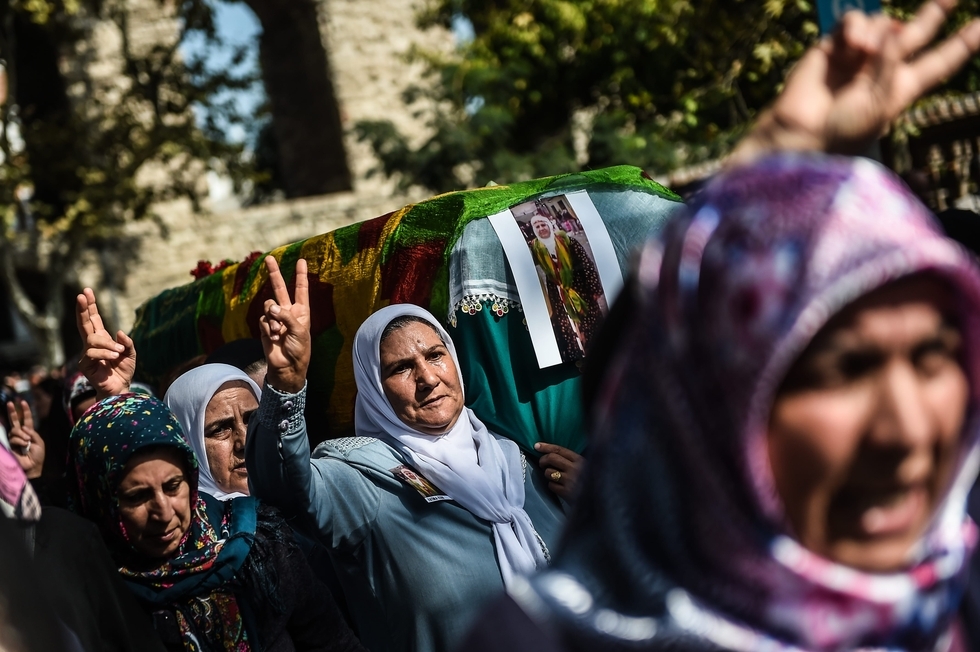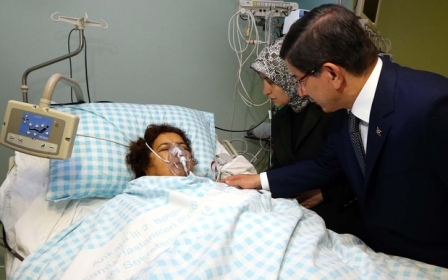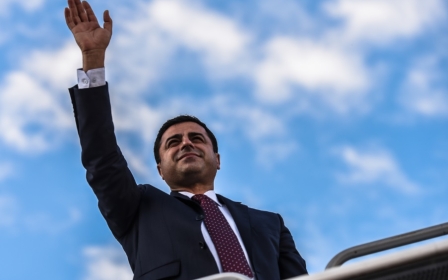Anger, rage, defiance and hope reign after Ankara massacre

ISTANBUL, Turkey - “You know what. Not only will we not succumb to fear but we will not allow our hopes for peace to die at the hands of these cowards.”
This is the primary sentiment of Munevver Iltemur who was present at the peace gathering in the Turkish capital Ankara on 10 October when twin suicide bombings caused more than 100 deaths.
Iltemur was among the thousands who had flocked from all over the country to participate in a peace gathering calling for an end to clashes between the Turkish state and Kurdistan Workers’ Party (PKK).
She was part of five busloads of friends and colleagues who had travelled to Ankara from the eastern province of Tunceli to - in her own words - sing and dance for peace and democracy.
Iltemur is a member of the Socialist Women Communities group. She and her friend were both injured in the leg by a flying object as a result of the blast.
“After the initial moment of panic passed, I thought to myself this is Suruc all over again and as I looked at my friend to flee the scene I realised we both couldn’t walk,” Iltemur told Middle East Eye.
“There were no ambulances on the scene and we were surrounded by dead bodies. Some other friends managed to bundle us into a taxi and get us to a hospital,” she said.
This is the third major attack carried out in Turkey since June and all three times Kurdish and left-leaning groups have been the targets.
Official condemnation
While officials were swift in their condemnation of the latest attack, many people see it as an insincere and shallow attempt at absolving themselves of responsibility.
Turkish President Recep Tayyip Erdogan, who is often vocal and quick to comment on all issues, only released a short message on the presidency’s website condemning the attack and calling for unity.
Prime Minister Ahmet Davutoglu has repeatedly said that the government has taken all requisite measures to bring to justice the perpetrators of previous attacks and that the government will spare no effort in bringing to justice those behind this attack as well.
Interim Interior Minister Selami Altinok’s remarks that there was no security lapse on the part of the state and his refusal to acknowledge the government’s failure to provide adequate security for a meeting that was officially sanctioned, has in particular irked many people.
“Every word they utter is a lie. This is pure and simple fascism. It is no different from the fascism of Hitler and Mussolini,” said Iltemur.
Yucel, 35, from Ankara who was also present at the gathering could barely hold back his tears while talking.
“I lost a close friend. All I feel is rage. Nothing else, just rage. They targeted humanity, peace and democracy,” he told MEE.
“The security measures must have been invisible because I didn’t see anything,” he said.
Political repercussions
While officials point to the Islamic State group as the most likely perpetrators of the attack, the co-chair of the pro-Kurdish Peoples’ Democratic Party (HDP), Selahattin Demirtas, has not minced his words and directly pointed the finger at the state.
He has been reported as saying that regardless of who the prime perpetrator of this attack is, it would be impossible to carry it out without state backing.
Can Dundar, the editor-in-chief of the staunchly secular and anti-government Cumhuriyet newspaper, in his column asked “Why were IS militants who have blood on their hands armed, trained and put on a pedestal for years?”
Most commentators in the pro-government media seem to view some sort of foreign conspiracy behind this attack.
In one such instance, Etyen Mahcupyan, a former advisor to the prime minister, wrote in the pro-government Daily Sabah: “The goal could be to render Turkey ineffective in the Middle East by causing it to focus on its domestic problems. Some obviously want Turkey to be obliged to move into a passive role in the context of the near future.
“Also, it can be argued that some outcomes regarding domestic policies are also desired, such as driving the public to despair, creating a lack of trust in the state, paralysing the government, creating an authority gap and rendering domestic peace impossible.”
Climate of fear
The general feeling in the pro-government camp is that having a hand in such an attack would be detrimental to the government’s election hopes, while most in the opposition camp believe the government has been set on creating a climate of fear ever since it failed to garner a single-party majority in the 7 June general elections.
This climate of fear, opposition figures have said, is designed to prove that the country will be faced with prolonged instability if the ruling Justice and Development Party doesn’t come to power on its own in the 1 November re-election.
Speaking to MEE on 12 October, Burhan Kayaturk, a parliamentarian from the Justice and Development Party representing the eastern province of Van, said it is ridiculous to even entertain the thought that the government or its leaders could have any role in the attack.
“Why would the government engage in acts that are contrary to its own interests and would hurt it at the polls? Our people are well-educated and well-informed and will see through these false accusations.”
Nuray Mert, a political scientist and newspaper critic who is a fierce critic of the government, told MEE that this has become a country of confused minds where everyone is attacking each other but on the basis of vague and abstract notions.
“The right way to go about it would be to hold the government responsible for failing to provide security for its citizens. That is a legitimate recourse and question since this government has been in control of all state mechanisms for the past 13 years and turned the country into a sort of police state run by an intelligence apparatus.”
Police response
Further fuelling anger is the police preventing people from marching to commemorate the dead at various events across the country. Some arrests and scuffles between police and citizens have been reported in Istanbul after a call was made by unions to participate in a march condemning the Ankara attack in central Istanbul.
“We have a government that looks after the palace, not the people. They are willing to wage war to cling on to power,” said Iltemur.
“We will grieve our lost ones now, but we will never let our hope for peace be eradicated if only to honour their memories.”
New MEE newsletter: Jerusalem Dispatch
Sign up to get the latest insights and analysis on Israel-Palestine, alongside Turkey Unpacked and other MEE newsletters
Middle East Eye delivers independent and unrivalled coverage and analysis of the Middle East, North Africa and beyond. To learn more about republishing this content and the associated fees, please fill out this form. More about MEE can be found here.




